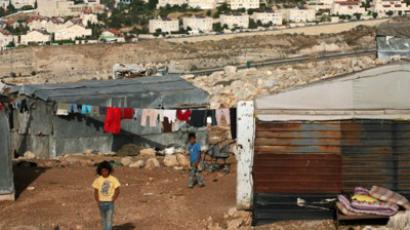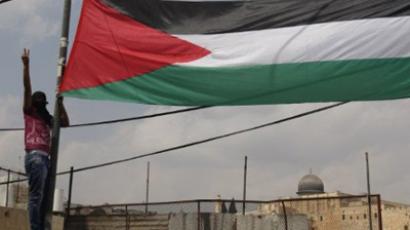Israel targets Palestinian solar panels in bid for West Bank dominance
Hundreds of Palestinians will be left without electricity should Israel’s order for the demolition of 8 solar panels in the West Bank go ahead, in what many say is an attempt to drive Palestinians out of the Israeli-controlled part of the territory.
“We are suspended between heaven and earth; the solar panels were a glimmer of hope for us,” Ali Mohamed Ihrizat, the village head of Imenizil, one of the places where the solar panels are scheduled to be demolished, told Agence France-Presse.The panels were constructed by international charities, but the Israeli authorities say they were built without permission.Guy Inbar, a spokesman for the Israeli military, has explained the decision: “Using the backing of international assistance does not give immunity to violations."This is just the latest standoff in Area C – a festering flashpoint of the Palestinian-Israeli conflict where the battles are fought not with guns and rockets, but permits and bulldozers.Created under the Oslo Accords in 1995, it constitutes nearly two-thirds of the West Bank, and is administered by Israel. More than 300,000 Jews live there alongside 70,000 Palestinians.Over the past decade Israel has freely given Area C's Jewish residents permits to build entire new “settlements,” which Israel’s critics have branded a form of colonization by stealth. In turn, Israel has routinely rejected over 90 per cent of Palestinian applications for construction and demolished nearly 2,000 Palestinian buildings in the last decade.While the Israeli settlements are hooked up to the Israeli water and electricity grid, the Palestinian settlements have to rely on wells and generators."The denial of permits for Palestinians on such a large scale raises the fear that there is a specific policy by the authorities to encourage a 'silent transfer' of the Palestinian population from Area C," claims Peace Now, an Israeli think-tank sympathetic to Palestinians.This is where the solar panels come in. Funded by European governments, NGOs have built dozens of these devices across Area C, serving an estimated 1,500 Palestinians. Each panel costs tens of thousands of dollars.An unnamed UN source told the Guardian that the demolition is not random. "From December 2010 to April 2011, we saw a systematic targeting of the water infrastructure in Hebron, Bethlehem and the Jordan valley," the source said. "Now, in the last couple of months, they are targeting electricity. Two villages in the area have had their electrical poles demolished. There is this systematic effort by the civil administration targeting all Palestinian infrastructure in Hebron.”A legal challenge by activist group Rabbis for Human Rights has temporarily frozen the demolition orders, though there are no plans as yet to cancel them.Noam Dotan, an Israeli who heads one of the NGOs that installed the panels, says the Israeli plan is immoral and self-defeating. He told AFP, "The panels are not a security threat. It's a positive project. What do they want? Do they want the people to be more poor? To be more violent?"














